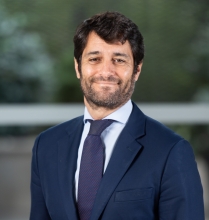Reflecting sustainability criteria in pay is key to achieving ESG goals
An increasing number of companies are taking sustainability criteria into consideration not only in executive and director pay, but also in the pay of their staff as a whole, in order to better achieve their ESG goals. We addressed this dynamic in the Garrigues Sustainable dialogs.
“Companies that make the effort to consider sustainability criteria create an employer brand that gives them a competitive advantage when it comes to attracting and retaining talent,” noted Eduardo Gómez de Salazar, partner in Garrigues’ Human Capital Services (HCS) department. To delve into the subject, in the Garrigues Sustainable dialogs we have been able to draw on the experience of a company – Acciona Energía – which has been doing this for years because sustainability forms part of its DNA.
How does it do it? Ana Benita, head of Organization, Talent and Wellbeing at Acciona Energía, explained that a significant portion of all employees’ variable pay (12.5% in 2023) is linked to achieving the group’s sustainability targets. In other words, matters such as the goal of having women hold a certain percentage of management positions not only concerns executives, but the entire staff.
Also of particular interest are the large number of initiatives that Acciona Energía has launched in the area of sustainable mobility (free group shuttles to workplaces, all parking spaces with free charging points, access to the parking space lottery according to the type of vehicle and its degree of pollution, discounts for using Acciona electric motorbikes, etc.).
Undoubtedly, the company has encountered obstacles when measuring targets. María Dolores Domenech, head of Sustainability at Acciona’s renewable energy without fossil legacy subsidiary, said that Acciona Energía has an ESG budget in place to avoid “being reactive when it comes to measuring targets.” The budget contains the metrics against which targets will be measured, “which go directly to the Acciona Bonus (variable pay).” Domenech pointed out that this leads to real involvement on the part of project and plant managers. “It is a way to conduct ongoing monitoring and take steps to achieve the targets,” she assured.
When it comes to managing the gender pay gap and the obligations imposed by Royal Decree 902/2020 on equal pay for men and women, Benita said that its implementation at Acciona Energía has not been a problem at Acciona Energía. “It did not alter our processes, since there was always pay equality,” she remarked. At the end of 2023, the gender pay gap at the company is 1.4% and the aim is to get it down to 0. She pointed out that the big challenge is attracting female talent for traditionally male positions, noting by way of example the difficulty of hiring female engineers at wind farms. Their goal is for all job positions to be occupied 50% by women and they continue to work towards this.
On corporate governance matters, the discussion included, among other issues, the directors’ remuneration model and the relevance of the audit and sustainability committee.
In short, as Eduardo Gómez de Salazar concluded, “the best way to tackle these challenges is for sustainability to form part of the company's culture.” At Acciona Energía this is indeed the case.
Contact

